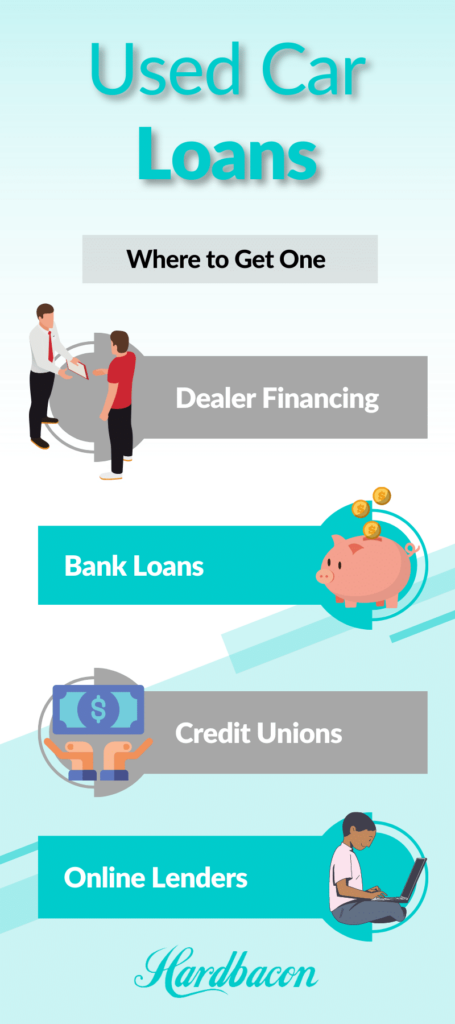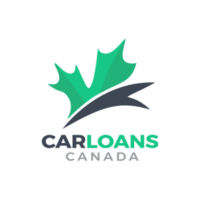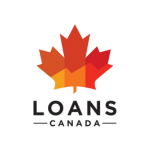Used Car Loans Explained for Canadians
By Daniel Schoester | Fact-checked by Maude Gauthier | Published on 29 Jun 2023


A used car loan allows you to finance purchasing a used car. It’s similar to a mortgage, where you’ll own the vehicle and make monthly payments. As you make payments, your loan balance will decrease, and you’ll eventually own the car outright. Used car loans are available from financial institutions, auto dealerships and private lenders. The amount you can borrow depends on your credit score, income and other criteria.
A used car loan allows you to own a used vehicle without needing the entire money upfront. Instead, you’ll be required to have a down payment and make monthly payments. Lenders will add interest to your repayments to compensate for their risk. The interest rate generally ranges from 10%-20%, depending on your creditworthiness. Although you need to make payments, you’ll own the car. It is similar to having a mortgage on a home. As a result, you’ll be responsible for managing repairs and damages to the vehicle.
In addition, your vehicle generally acts as collateral for the loan. This means missing payments can result in the seizure of your car. To enforce this, most lenders require a spare set of keys; some require installing an ignition inhibitor and GPS tracker. Lenders calculate your car loan based on your income, credit score, and vehicle of interest. The loan size typically ranges up to $35,000. In most cases, you’ll also have a 48-72 month payback period.
Advantages and Disadvantages
| Advantages | Disadvantage |
|---|---|
| – Affordable monthly payments – Build credit | – Higher interest rates |
One of the main advantages of a used car loan is that it can help you afford a car you might not otherwise be able to purchase. By spreading the cost of the vehicle out over several years, you can make it more affordable every month. Another advantage of a used car loan is that it can help you build your credit. As you make your loan payments on time, you’ll demonstrate to lenders that you’re a responsible borrower.
One of the most significant disadvantages of a used car loan is the interest rate. Because lenders consider used car loans riskier than new ones, they often have higher interest rates. This means that you’ll end up paying more in interest over the life of the loan.
The Two Types of Used Car Loans
Before taking out a loan, it’s essential to understand the different types of loans available. The two main types of used car loans are secured and unsecured loans. Secured loans, such as those provided by Car Loans Canada and Loans Canada, provide more favourable lending characteristics but require collateral. This means that continuously failing to make payments will result in the seizure of your vehicle.
The advantage of this type of loan is that it offers more favourable terms than unsecured loans. You may be able to borrow up to 90% of the car’s value, depending on your credit rating. The interest rate may also be lower because there is less risk for the lender.
On the contrary, unsecured loans don’t require collateral but are more difficult to find for used cars. If you find an unsecured used car loan, the lending conditions will be less favourable. For example, you’ll have a high-interest rate and may be unable to borrow much money.
Used Car Loan Requirements
You’ll typically need to meet a few basic requirements to qualify for a used car loan. These may include:
- A steady income
- Proof of car insurance
- A good credit score (usually 650 or higher)
- Proof of income and employment
- A down payment (usually 10-20% of the purchase price)
Dealership Financing
If you’re purchasing a used car directly from a dealership, they may provide you with lending options. Dealerships work with different lenders to provide financing options and offer secured and unsecured loans. In addition, dealerships sometimes have special offers that can save you money on financing or lower the interest rate.
The advantage of dealership financing is that it’s quick and convenient. You can finance your car and purchase it all in one place without going through a separate lender. You can usually also negotiate the interest rate and terms of the loan with the dealership.
However, dealership financing may have higher interest rates and fees than other lending options. Your selection, such as the lender and loan type options, will be limited. Also, dealerships may pressure you to take out financing through them rather than shopping around for the best rates and terms.
Bank Loans
Banks can provide both secured and unsecured loans for used cars. Secured bank loans require you to use a vehicle or asset as collateral. Depending on your credit rating, banks generally lend up to 80% of the car’s value. Unsecured bank loans don’t require collateral but are typically more challenging to find for used vehicles.
The advantage of bank loans is that they often offer better interest rates than dealerships and can be easily tailored to your requirements. However, you’ll need good credit to qualify for the best rates and terms. Banks may also require a hefty down payment and have strict lending criteria if you’re applying for an unsecured loan.
Credit Unions
Credit unions are non-profit organizations that provide financial services to their members. They often have more flexible borrowing requirements and may be willing to work with borrowers with lower credit scores. Credit unions also provide more personalized service than banks, so a credit union is a right choice if you prefer a more hands-on approach to financing.
Private Lenders
Finally, some private lenders offer used car loans. These lenders usually have more lenient requirements than banks or credit unions and may even offer to finance those with bad credit. However, online lenders typically charge higher interest rates because there is a greater risk for them. Let’s simplify your journey by introducing the top contenders in Canada’s online used car lending space.
Car Loans Canada

Car Loans Canada is an online platform offering diverse financing options for car purchases. Accessible in most parts of Canada, except Quebec, Northwest Territories, and Yukon, it caters to all credit scores and provides a swift two-minute application process. The platform not only connects users with a variety of lenders and dealerships nationwide, but also provides educational resources to guide borrowers. With loan terms from 1 to 8 years and rates starting at 8.99%, it allows potential borrowers to secure pre-approval without impacting their credit score.
Loans Canada

Loans Canada offers an online car loan platform that allows you to compare multiple lenders with a single application. This approach helps you find the most suitable loan terms and interest rates, customized to your individual financial circumstances and budget.
Proceed Step-by-Step
When getting a used car loan, shopping for the best rate and terms is essential. Be sure to compare lenders carefully and read the fine print before signing any contracts. However, the rest of this section will walk you through the process.
- Determine your budget: Before you start shopping for a car, it’s essential to determine how much you can afford to pay for the car each month and for the entire loan.
- Shop around: Take the time to compare rates and terms from multiple lenders. Look at both traditional lenders, such as banks and credit unions, and online lenders.
- Get pre-approved: Before you visit a dealership, you can get pre-approved for financing. This will help ensure you know your limit and don’t pay too much for the car. Some specialized lenders can pre-approve you for a used car loan.
- Negotiate: Once you get to the dealership, negotiate the price of the car before discussing terms and financing. Getting a good deal on the vehicle can reduce your monthly payments and save you money in the long run.
- Choose a loan: Once you’ve settled on a price, it’s time to choose your loan. Consider both secured and unsecured loans, as well as special offers or deals from the dealership.
- Sign the contract: Read through the entire loan contract before signing it. Ask questions if there is anything you don’t understand, and make sure you know your rights as a borrower.
- Make payments on time: Once the loan is finalized, make all your payments on time. This will help you establish a good credit score and pay off the loan with minimal interest charges.
Tips for Getting the Best Used Car Loan Rates
If you’re looking to secure the best possible rates and terms for your used car loan, there are two categories of things you can do; find the best lender, or increase your creditworthiness. The most obvious is shopping around to find the best lender. Ensure to compare loans between banks, credit unions, and online lenders, such as Car Loans Canada.
A good credit score is also essential when getting the best rates and terms on a used car loan. If your credit score isn’t where you want it to be, consider making a larger down payment or applying with a cosigner. A larger down payment can help you qualify for better rates and lower monthly payments. Meanwhile, asking a family member to co-sign your loan allows you to leverage their creditworthiness.
Interest Rate
The average rate for all types of car loans is around 8%. However, used car loans typically have higher interest rates because there is more lender risk. As a result, you can pay around 10% to 20% depending on your credit score, income, and vehicle. However, interest rates can exceed 30% in some situations. Generally, the better your credit score and income, the lower your interest rate.
You can typically choose between a fixed or variable-rate loan. A fixed loan offers more predictability, whereas a variable rate allows you to take advantage of falling interest rates. This is because your monthly payment for a variable-rate loan will change with interest rates while a fixed rate will remain the same.
Fees & Penalties
Used car loans typically come with closing costs, application fees, and other miscellaneous charges. Make sure to read through the terms and conditions of your loan so you understand all the associated costs. Also, late payments can result in penalties or additional interest rates.
Vehicle Restrictions
These can vary from lender to lender, but generally, lenders will only finance vehicles up to seven years old. They may also have mileage restrictions and other requirements. It’s essential to check with your lender before applying for a loan so you know what you can and cannot finance.
Used car loans can help you purchase the vehicle of your dreams, but there are several things to consider before applying. Review all the associated costs and understand your loan’s terms and conditions. If you need additional help or have questions, don’t hesitate to contact a financial advisor or lender for more information.
